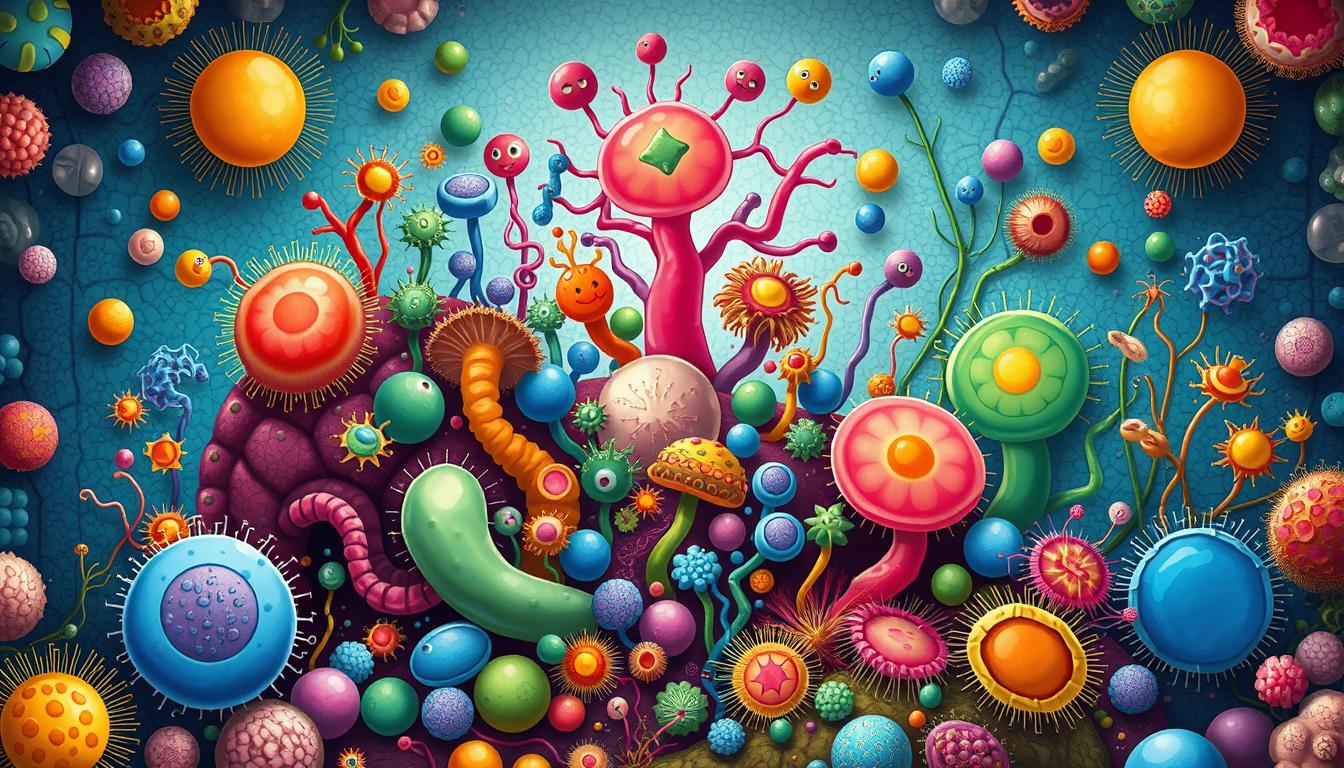Microbiome Management
Welcome to the fascinating world of microbiome management! Did you know that trillions of microbes live on and within our bodies? They form a complex ecosystem called the microbiome. These tiny organisms are key to our health, affecting digestion, nutrient absorption, immune function, and even our mental well-being.
The gut microbiome has gotten a lot of attention lately. Scientists have found that the diversity and balance of microbes in our gut greatly impact our health. By managing our microbiome, we can improve our overall health and well-being.
Managing our microbiome means keeping it healthy. We can do this through diet, probiotics, prebiotics, and lifestyle changes. A healthy microbiome boosts our immunity, improves digestion, and supports our mental health.
In the next sections, we’ll dive deeper into microbiome management. We’ll look at what affects our microbiome, the benefits of managing it well, and how to keep it healthy. Let’s start this journey together and learn how to use our microbiome for better health!
Key Takeaways
- The microbiome plays a vital role in human health, influencing digestion, immunity, and mental well-being.
- Microbiome management involves monitoring and manipulating the microbiome to maintain optimal health.
- Dietary changes, probiotics, prebiotics, and lifestyle modifications can help nurture a healthy microbiome.
- Understanding the factors that influence microbiome composition is crucial for effective management.
- Microbiome research is expanding, offering exciting possibilities for personalized health solutions.
Understanding the Microbiome and Its Importance
The human microbiome is a world inside us, filled with trillions of microorganisms. These tiny beings are key to our health and happiness. They work together like a team, helping our bodies function smoothly.
What is the Microbiome?
The microbiome is made up of all the microbes in and on our bodies. This includes bacteria, fungi, viruses, and their genes. The gut microbiome is especially important, housing bacteria like Prevotella and Ruminococcus. These microbes have lived with us for ages, helping us stay healthy.
The Role of Microbiomes in Human Health
The microbiome affects many parts of our health. It helps with digestion, metabolism, and even our mood. Studies show that it can help treat diseases like ulcerative colitis and Crohn’s disease.
Changes in the gut microbiome can also affect our liver health. Scientists have found a way to use stool samples to diagnose liver problems. This shows how important the microbiome is for our overall health.
Factors Influencing Microbiome Composition
Many things can change our microbiome. The National Institute of Environmental Health Sciences (NIEHS) studies how:
- Air pollution
- Antimicrobials
- Artificial sweeteners
- Cancer
- Chronic stress
- Diet
- Flame retardants
- Heavy metals
- Infant health
- Pathogens
- Pesticides
For instance, air pollution can change the gut microbiome in mice. It also affects children’s respiratory microbiome. Triclosan, found in many products, can make microbes resistant to antibiotics and heavy metals.
| Factor | Effect on Microbiome |
|---|---|
| High-fat diet | Alters gut microbiome, predisposing mice to obesity |
| Arsenic exposure | Changes gut microbiome in mice, affects DNA repair |
| Birth mode and early diet | Affects infant gut microbiome, impacting metabolism, immunity, and brain development |
As research on the microbiome grows, we learn more about its importance. With over US$1.7 billion invested in the past decade, it’s clear we need to understand how to keep our microbiome healthy. This knowledge will help us tackle big challenges like climate change and sustainable agriculture.
Benefits of Effective Microbiome Management
Managing the microbiome well can greatly improve health. A balanced gut microbiome boosts the immune system, aids digestion, and enhances mental health.
Enhanced Immunity
The gut microbiome is key to a strong immune system. With more bacterial cells than human cells, it plays a huge role in health. A balanced gut helps fight infections and lowers disease risk.
Improved Digestion and Nutrient Absorption
A healthy gut is vital for digestion and nutrient absorption. The gut hosts many bacteria, helping break down food and extract nutrients. Probiotics like Bifidobacteria and Lactobacilli can ease IBS symptoms.
Mental Health Connections
The gut and brain are connected through the gut-brain axis. Gut bacteria produce neurotransmitters that affect mood. A balanced gut microbiome may help manage depression. Eating a varied diet and fermented foods supports both gut and mental health.
“All disease begins in the gut.” – Hippocrates
A healthy gut microbiome is crucial. Understanding diet, toxins, and infections helps maintain a balanced gut. Regular tests and health checks can identify and fix imbalances, improving overall health.
| Factor | Impact on Gut Microbiome |
|---|---|
| High-sugar, high-fat diet | Favors less helpful microorganisms |
| Environmental toxins (alcohol, tobacco, pollutants) | Can harm the microbiome |
| Infections, SIBO, IBD, atherosclerosis | Related to gut dysbiosis |
Strategies for Microbiome Maintenance
Keeping your gut microbiome healthy is key to feeling good. Eating the right foods, using probiotics and prebiotics, and drinking enough water can help. Let’s look at some ways to care for your gut.
Dietary Changes for a Healthy Microbiome
What you eat greatly affects your gut microbiome. Eating a variety of foods, especially plant-based ones, is important. These foods are full of fiber, which is great for your gut microbes.
Raw or lightly cooked veggies are best because they keep more fiber. Blending fruits and veggies is better than juicing because it keeps the fiber.
Eating organic, antibiotic-free meat and cutting down on processed carbs is good for your gut. Foods like turmeric and ginger can also help fight inflammation. Eating a variety of probiotic-rich foods is key for good gut health.
Probiotics and Prebiotics: What You Need to Know
Probiotics are good microbes found in foods like yogurt and sauerkraut. They help keep your gut bacteria balanced. Prebiotics, like garlic and bananas, feed the good bacteria in your gut.
Adding both probiotics and prebiotics to your diet can boost your gut health. Probiotic supplements are helpful for some health issues. But, always talk to a doctor before starting any supplements.
The Role of Hydration
Drinking enough water is vital for a healthy gut. It helps your digestive system work well and keeps your gut bacteria happy. Drink water all day and eat hydrating foods like cucumbers.
Some drinks, like kombucha, can also help your gut. But, watch the sugar in these drinks and choose low-sugar options.
How Lifestyle Choices Affect the Microbiome
Lifestyle choices are key to our gut microbiome’s health. Our gut is home to trillions of microorganisms. These tiny beings help us digest food, fight off infections, and even affect our mood.
Stress, exercise, and sleep can change our gut’s balance. By choosing wisely, we can help our gut bacteria thrive.
The Impact of Stress on Microbiome Health
Stress can upset our gut’s balance, leading to inflammation and disease. Stress hormones like cortisol can harm good bacteria. This can lead to conditions like IBD and IBS.
Exercise and Its Benefits
Exercise boosts good gut bacteria, improving our microbiome’s health. It helps produce SCFAs, which feed our gut and boost our immune system. Exercise also lowers stress, helping our gut stay balanced.
Sleep and Microbiome Balance
Poor sleep harms our gut microbiome and messes with our body’s clock. Lack of sleep changes our gut bacteria, favoring bad ones. Good sleep keeps our gut in check and supports our body’s rhythm.
| Lifestyle Factor | Impact on Microbiome |
|---|---|
| Chronic Stress | Reduces diversity, increases harmful bacteria |
| Regular Exercise | Promotes growth of beneficial bacteria, enhances SCFA production |
| Poor Sleep | Alters composition, reduces beneficial microbes, disrupts circadian rhythm |
Managing stress, exercising regularly, and sleeping well can improve our gut microbiome. These habits support our health and well-being. As we learn more about lifestyle and microbiome, it’s clear our daily choices greatly impact our tiny gut allies.
Common Misconceptions About Microbiome Management
Research on the human microbiome is growing fast. But, so are myths about managing a healthy gut. It’s key to know what’s true and what’s not to avoid harmful practices.
Debunking Myths Around Probiotics
Many think all probiotics are the same. But, different strains offer different benefits. For instance, Align’s unique probiotic strain, Bifidobacterium 35624TM, is backed by over 20 years of research. It’s been the top doctor-recommended probiotic in the U.S. since 2008.
Choosing a well-studied probiotic brand is crucial. It ensures you get the right bacteria for your gut.
Clarifying the Role of Antibiotics
Some believe antibiotics don’t affect the gut microbiome long-term. But, antibiotics can really mess with the balance of gut bacteria. This can cause digestive issues and weaken the immune system.
It’s important to use antibiotics wisely. Supporting the microbiome with probiotics during and after treatment is key.
Understanding Personalization in Microbiome Solutions
There’s a growing understanding that one approach doesn’t fit all. Our microbiomes are shaped by genetics, diet, and lifestyle. Personalized care is the future of gut health.
This might include tailored diets, custom probiotics, and more. It’s all based on what your microbiome needs.
| Myth | Fact |
|---|---|
| All probiotics are the same | Different strains offer varied benefits |
| Antibiotics have no long-term effects | Antibiotic use can disrupt the microbiome |
| A generic approach to microbiome health is sufficient | Personalized solutions are the future |
As research on the microbiome grows, staying informed is crucial. By debunking myths and using evidence-based methods, we can improve gut health for everyone.
Future of Microbiome Research
Microbiome research is growing fast, with new discoveries coming up. Countries in North America, Asia, and Europe are leading the way. China, in particular, has seen a big jump in research since 2018. This shows how much people are interested in this field.
Innovations in Microbiome Testing
New methods in microbiome testing are exciting. Improvements in DNA extraction and culturomics will change how we work. These changes will help us understand the microbiome better.
New sequencing technologies will also make a big difference. They will let us study the microbiome at a finer level. This means we can analyze it more precisely.
The Role of Technology in Microbiome Management
Technology, especially AI and machine learning, will be key in managing the microbiome. These tools will help us make sense of lots of data. They will help us find patterns and create personalized solutions.
Cloud platforms and special R packages will make data analysis easier. This will help us work faster and more efficiently. New treatments, like dietary changes and probiotics, will also be developed thanks to technology.
Ethical Considerations in Microbiome Research
As we move forward, we must think about the ethics of microbiome research. We need to protect privacy and respect individual rights. The use of microbiome data for disease diagnosis raises important questions.
It’s important to create strong ethical guidelines. This will help ensure that the benefits of research are shared fairly. By focusing on ethics, we can gain public trust and support for microbiome research.
Source Links
- Emerging strategies for precision microbiome management in diverse agroecosystems – Nature Plants
- Harnessing the microbiome to prevent global biodiversity loss – Nature Microbiology
- Microbiome
- The Microbiome
- Microbiome definition re-visited: old concepts and new challenges – Microbiome
- How Does Your Gut Microbiome Impact Your Overall Health?
- What Is Your Gut Microbiome?
- How To Heal & Maintain A Healthy Gut
- How to Improve and Reset Gut Health
- How to maintain a healthy gut microbiome in 2024
- The Impact of Diet and Lifestyle on Gut Microbiota and Human Health
- The Effects of Lifestyle and Diet on Gut Microbiota Composition, Inflammation and Muscle Performance in Our Aging Society
- Frontiers | Exploring the gut microbiota: lifestyle choices, disease associations, and personal genomics
- Microbiome Myths and Facts | Align
- Human microbiome myths and misconceptions – Nature Microbiology
- Daily briefing: 12 microbiome myths busted
- Microbiome research outlook: past, present, and future
- Review article: the future of microbiome‐based therapeutics







